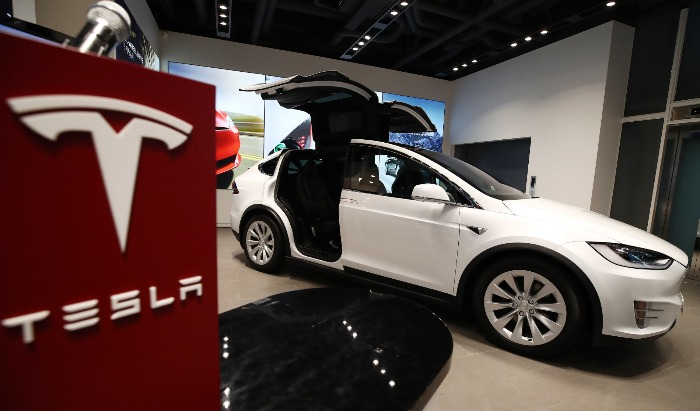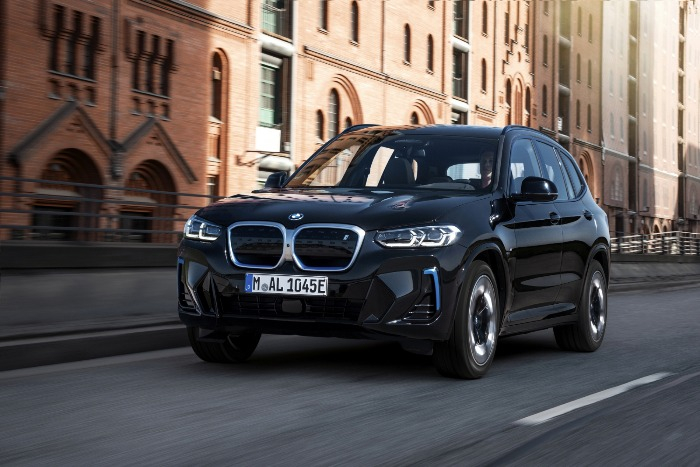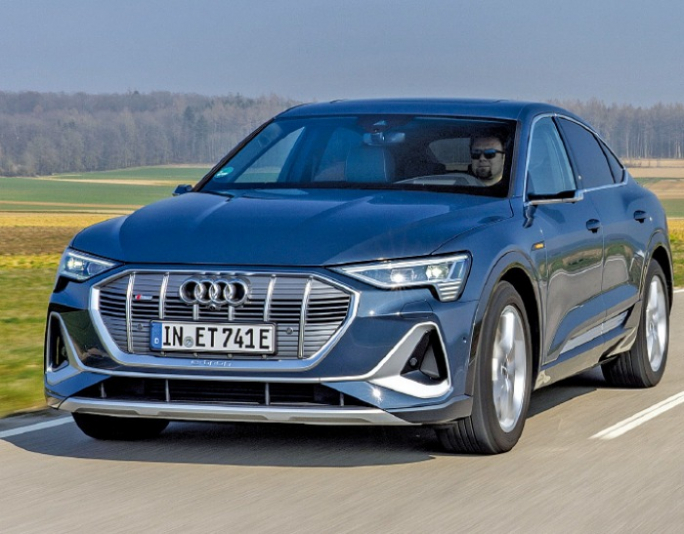Automobiles
EVs lack luster in S.Korea’s secondhand car market
The price of secondhand Tesla Model X fell at the sharpest rate than other used cars
By Jun 28, 2023 (Gmt+09:00)
2
Min read
Most Read
LG Chem to sell water filter business to Glenwood PE for $692 million


Kyobo Life poised to buy Japan’s SBI Group-owned savings bank


KT&G eyes overseas M&A after rejecting activist fund's offer


StockX in merger talks with Naver’s online reseller Kream


Mirae Asset to be named Korea Post’s core real estate fund operator



Electric vehicles suffered sharper price falls in South Korea’s secondhand car market this year, compared with combustion engine and hybrid cars in the already slow market.
Last year, secondhand EVs were sold even at a higher price than new models, which customers had to wait for about one and a half years to receive due to automotive chip shortages.
Now higher electricity rates, subsidy cuts for EVs and steady oil prices reversed the trend, making eco-friendly models less attractive than before.
Further, EV makers such as Tesla, Polestar and BMW offer discounts and lavish promotional incentives to woo drivers grappling with high interest rates amid the economic slowdown.

Secondhand EV prices dived 21% on average to 36.4 million won ($27,930) in South Korea this year, versus 46.2 million won the previous year, according to the country’s largest secondhand car retailer K Car Co. on Tuesday.
That compared to a 12.4% drop to 20 million won for diesel cars; a 2.9% fall to 26.5 million won for gasoline vehicles; and a 2.6% decline to 31.1 million won for hybrid models.
The price changes are based on K Car’s analysis of 740 secondhand car models.
Tesla Model X led the price falls, down 28.2%. It marked the sharpest price drop among secondhand cars sold at home this year. Its used car now trades at 45.4 million won, versus 57.1 million won a year before.
Tesla’s besting-selling vehicle Model 3 sells for 45.4 million won, down 20.4% on-year. The Model Y trades at 62.8 million won, a 20.2% decrease over the same period.
Audi e-tron saw its secondhand model price tumbling 20.5% to 64 million won, with the price of Hyundai’s IONIQ 5 down 20.2% to 38.1 million won in the used car market.

“Low maintenance costs are the big advantage of EVs, despite their higher prices than combustion engine vehicles,” said Park Sang-il, a senior dealer at K Car.
“But rising charging fees and steady oil prices are driving (secondhand) EV prices lower.”
BMW’s iX3, a popular all-electric model, sells at 58.5 million won in the used car market, down 10%. Mercedes-Benz EQC saw its price down 7.4% to 61.4 million won.
CHARGING FEES
EVs have yet to be widely adopted due to concerns about its battery safety and performance, coupled with the lack of charging stations.
Charging fees for EVs have been on the rise, with domestic electricity rates up 13.2% this year.
It costs 324.4 won per kilowatt hour (kWh) to fill up EV at a 50kW fast charger, almost twice as much as the 173.6 won in 2020.
At a 100kW charger or above, which has a 100kW charging capacity or more, the charging cost amounts to 347.2 won per kWh.
Power utility Korea Electric Power Corp. (KEPCO) raised the electricity rate by 8 won per kWh on May 16. It also jacked up EV charging fees to 8.8 won per kWh for an apartment charging station with a 100kW capacity or below.
The Ministry of Environment, the country’s biggest operator of fast EV charging stations, is considering raising charging fees to reflect the electricity rate hikes.
Still, South Korea charges lower fees to fuel EVs than other countries. Given that, its recent price falls seem to be overdone, dealers said.
Write to Nan-Sae Bin at binthere@hankyung.com
Yeonhee Kim edited this article
More to Read
-
 AutomobilesHyundai Motor to take 1st crack at Korea’s used car market
AutomobilesHyundai Motor to take 1st crack at Korea’s used car marketJun 26, 2023 (Gmt+09:00)
3 Min read -
 AutomobilesKorea’s secondhand car market cools amid elevated interest rates
AutomobilesKorea’s secondhand car market cools amid elevated interest ratesJan 10, 2023 (Gmt+09:00)
2 Min read -

-
 AutomobilesTop Korean companies’ new battlefield: Used car market
AutomobilesTop Korean companies’ new battlefield: Used car marketJun 24, 2022 (Gmt+09:00)
3 Min read -
 AutomobilesHyundai, Lotte to join used car market, seen as boost for small players
AutomobilesHyundai, Lotte to join used car market, seen as boost for small playersMar 18, 2022 (Gmt+09:00)
3 Min read -
 Private equityK Car's evolution into top Korean used car sales platform
Private equityK Car's evolution into top Korean used car sales platformMar 08, 2022 (Gmt+09:00)
4 Min read
Comment 0
LOG IN


